ALERT: Three U.S. Churches to Vote on Anti-Israel Resolutions this Spring
Boycott movement promoted in America’s liberal Protestant churches
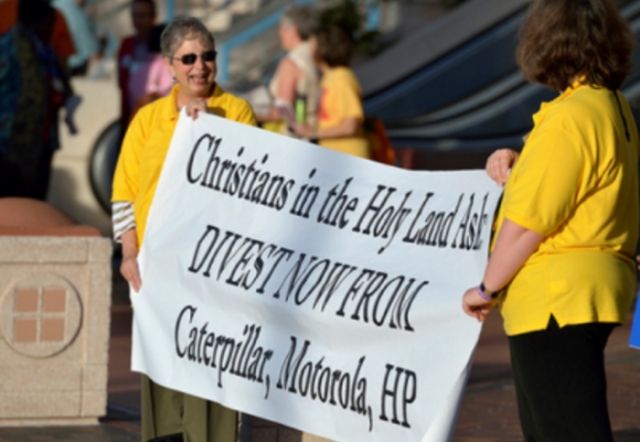
This spring three U.S. mainline churches, the Presbyterian Church (PCUSA), the United Methodist Church (UMC), and the Unitarian Universalist Church (UU), will feature a number of anti-Israel BDS-related resolutions at their annual meetings.
Boycott, Divestment, and Sanctions (BDS) activists are already anticipating that “2016 could be the biggest year yet for church divestment”.
The US Campaign to End the Israeli Occupation (USCEIO), an anti-Israel umbrella group for the BDS movement, recently released a call to action encouraging supporters to sign petitions, and follow and ‘like’ the efforts of anti-Israel member groups within these liberal Protestant churches via emails and social media.
Below we highlight what’s in store in the months ahead in the anti-Israel movement’s ongoing campaign to hijack America’s liberal Protestant churches.
Introduction
Anti-Israel Palestinian NGOs have been able to infiltrate these churches by forging close partnerships with church sub-groups. They then collude with radical anti-Israel Jews, who willingly offer Jewish backing as cover for pro-BDS positions.
As I document further below, these Jews—which represent only the tiniest sliver of Jewish public opinion—are more than happy to help delude church members into thinking that there’s significant support for anti-Israel divestment with the American Jewish community.
Together, these allies within the churches ensure that members are exposed to a relentless barrage of anti-Israel propaganda.
So the churches have become forum for a Palestinian solidarity politics, effectively crowding out other critical issues.
Sidelined on the agenda is Islamist anti-Christian hostility, the genocidal persecution and suffering of Christians throughout the Middle East, and the potential destruction of the region’s ancient Christian communities.
Even the plight of Christian Palestinians in the West Bank and Gaza, who are routinely attacked and targeted for discrimination, isn’t taken up in these liberal/progressive Christian churches as a matter of serious concern.
Basically, the anti-Israel BDS groups operating in these mainline Protestant churches have “sucked all the oxygen out of the room” when it comes to talking about oppressed Christians in the Middle East.
Israel is promoted as the greatest source of suffering in the region, even though the Christian community in Israel is thriving.
As I note further below, many Christian Israelis are fierce patriots. But the anti-Israel lobbyists in the churches make sure that fellow members of these Protestant denominations never hear from them; their authentic, lived experiences are out of synch with the central narratives they want to promote: Israel as an arch-villain and a racist, oppressive state.
For the most part, this is being played out with little opposition. But as I note below, some church members are courageously struggling to resist these lethal narratives about Israel that have been gaining strength in their beloved faith communities.
Share this post.
Spread the word about how a minority of committed anti-Israel, and in many cases anti-Semitic, activists are trying to steer some of America’s oldest churches astray toward a morally suspect agenda.
Because the best antidote to hate is exposure.
The Presbyterian Church (USA)
In 2014, after a contentious debate at its General Assembly, members of the PCUSA narrowly voted 310-303 to approve divestment from three companies that do business with Israeli security services in the West Bank: Caterpillar, Motorola Solutions and Hewlett-Packard.
The move was largely the result of an aggressive lobbying campaign on the part of the Israel Palestine Mission Network (IPMN), an anti-Israel member group within the church.
Now, the IPMN has reportedly placed a new resolution on the agenda for the upcoming biennial meeting in Portland, Oregon scheduled for June: dropping support for the two-state solution.
The move is being opposed by Presbyterians for Middle East Peace (PFMEP), another sub-group within the church that’s long attempted to counter the IPMN’s anti-Israel and pro-BDS messaging.
In 2014, the group took out a full page ad in the New York Times signed by scores of Presbyterian clergy and laypeople. The ad urged fellow congregants to vote against divestment from Israel and instead in favor of opportunities to strengthen joint Israeli-Palestinian economic, educational, and cultural ventures.
PFMEP also actively worked with the Jewish Council on Public Affairs (JCPA) to successfully vote down a church divestment resolution back in 2012.
But it’s been an uphill battle for the PFMEP.
Here’s a short video clip from its Peacemaking Breakfast at the PCUSA General Assembly back in 2011. It offers a good indication of what the group has been up against. I was delighted to see my Syracuse University colleague featured in it. His statement against BDS is strong and compelling. I only wish he had been given more air time:
Efforts to Deflect BDS with a New Resource Guide
Last week, PFMEP published a new anti-BDS pamphlet and resource guide aimed at countering the IPMN’s anti-Israel activity and stopping the church from abandoning support for a negotiated peace based on the principle of “two states for two peoples”.
A #proisrael Presbyterian group is helping #jewish groups fight against #BDS! Thank you!https://t.co/bvHnfSsvrg
— CAMERA on Campus (@CAMERAonCampus) February 8, 2016
At 80 pages, complete with graphs and charts, 151 hyperlinked sources to peer-reviewed material, and a 10 page bibliography, the document reads more like a book than a pamphlet.
The volume is extraordinarily well-done. It’s both a history of the conflict and a blueprint for “Christian peacemakers”.
Various sections are devoted to documenting the Jews as indigenous to the Land of Israel, and to emphasizing the legitimacy of Zionism and the Jewish people’s right to self-determination.
Others detail Israel’s longstanding support for the “land for peace” formula and its multiple efforts to negotiate in good faith, only to be rebuffed by Palestinian leaders. Israel’s legitimate security needs are also taken up in a comprehensive fashion. And the role that Hamas and other radical Islamist organizations play in destroying the possibilities for peace features centrally throughout.
Palestinians are treated fairly and with compassion for Palestinian Christians in the West Bank and Gaza, continually abandoned by their feckless governments and abused there by radical Islamist extremists.
The study also emphatically rejects BDS:
The Boycott, Divestment and Sanctions (BDS) movement has been pressuring the PC(USA) for over a decade to divest from companies doing business with Israel which relates to the West Bank and Gaza. As this report argues, this kind of economic ‘pressure’ usually hurts the wrong people and will not move towards peace. It makes a statement that might appear to be proactive, encouraging us to feel as though we are doing our small part to relieve the plight of the Palestinian people, but is likely to achieve negative consequences…The BDS movement offers a one-sided, zero-sum solution that does not give voice to the legitimate concerns and fears of Israelis. This is what the PC(USA) has recently chosen, by a narrow margin, to support. Such a perspective does not give either the Israeli or Palestinian people the hope, peace, and security they deserve. A stance that ignores the pleas of Palestinians for autonomy is as futile as a stance that does not address the legitimate security needs of Israelis. A mutually negotiated two-state solution provides more hope for the future of the Holy Land and all its inhabitants”.
Sabeel in the PCUSA
According to its press release, the PFMEP views the new resource as a way to advance the Christian values of peace, empowerment and coexistence.
The study guide is also meant to serve as a refutation of, and replacement for, the IPMN’s widely discredited 74 page “education resource” and accompanying DVD, Zionism Unsettled: a Congregational Study Guide.
Released two years ago in advance of the church’s successful divestment vote, and still available for sale on its website, that tract views Zionism as an “oppressive, imperious, and exploitative” ideology.
Its postscript is written by Palestinian Anglican priest Naim Ateek, founder of east Jerusalem’s Sabeel Ecumenical Liberation Theology Center.
In it, Ateek characterizes Zionism as a “false theology” and a “struggle for colonial and racist supremacist privilege”.
In Ateek’s words, Zionism Unsettled is:
the equivalent of declaring Zionism heretical, a doctrine that fosters both political and theological injustice. This is the strongest condemnation that a Christian confession can make against any doctrine that promotes death rather than life”.
As we noted in a prior post, Sabeel and its American affiliates—FOSNA (Friends of Sabeel-North America)—have played a critical role in seeking to reverse Christian support for Israel within America’s mainline churches, especially in the PCUSA, where its established a close association with the IPMN.
FOSNA is behind or involved in virtually every pro-BDS resolution that’s passed or is currently pending in Christian denominations.
Ateek and the materials that he and Sabeel produce cast the Israeli-Palestinian conflict in “supercessionist terms”. Basically, they use anti-Judaic tropes to portray Israel as a Christ-killing nation that blocks God’s purpose for humanity.
Bottom line: PFMEP is hoping that its new resource guide, with its message of the church as a “repairer of the breach” among Christians, Jews, and Muslims, will help to convince enough Presbyterians to denounce the latest IPMN-endorsed resolution at its upcoming convention.
But IPMN has dug deep roots in this church, succeeding in convincing far too many that BDS is based on Christian values, ethics and faith in God. For years, church members have reportedly heard from this sub-group about Israel holding Palestinians under “biblical scale enslavement” and poisoning Palestinian livestock, among other alleged crimes.
So it’s by no means assured that the PFMEP’s view will prevail at the PCUSA’s June conference.
The United Methodist Church (UMC)
Last month the UMC, the largest mainline Protestant group in the United States with some seven million members (and roughly 12 million worldwide), announced that it had placed five Israeli banks and one real estate and construction company on its blacklist for their alleged involvement in the “mistreatment of Palestinians” and financial support of “illegal Israeli settlements”.
Basically, the church decided to no longer invest its pension board’s portfolio in these entities (the portfolio will still include other Israeli companies, including Teva, Israel Corp, Cellcom, Israel Chemicals and Wix.com).
In so doing, the pension board identified Israel and the Palestinian territories as among more than a dozen “high risk” countries and areas. Other countries on the list include Saudi Arabia, the Central African Republic, Sudan and North Korea.
In advance of the decision, a report by the church’s Human Rights and Investment Task Force referred to Israel’s “prolonged and systematic pattern of human rights abuses” 19 times, Sudan twice, and made no reference to any other countries.
Then, the UMC’s pension fund published a 4 page document “Addressing Human Rights—Israel and the Palestinian Territories” that made no mention of Hamas, the Palestinian Islamic Jihad, or terrorism.
The Anti-Defamation League reacted swiftly to the UMC announcement, issuing a condemnation of the move as a “barely disguised expression of anti-Semitism” whose true goal wasn’t Palestinian welfare, but the “further demonization of Israel” and the destruction of the Jewish state:
We not only question the criteria used by the Church to identify these Israeli companies as complicit in alleged human rights abuses, but also their intent…While the Church investment in these Israeli companies was minimal, the symbolism of blacklisting banks, which represent the bedrock of the Israeli financial sector and the economy in general, is quite significant and surely was considered by the pension board. We would ask whether the Church applies the same level of scrutiny to all firms in its portfolio.”
These condemnatory statements have apparently fallen on deaf ears.
Four New Divestment Proposals
Now, the United Methodist Kairos Response (UMKR), a pro-BDS advocacy group within the church, is submitting four new proposals for members to “prayerfully consider” at the upcoming General Conference in May (also in Portland, Oregon).
Three would require divesting from companies involved with the Israeli “occupation”, and another would establish a screen to preclude investments in companies doing business in any illegal settlements on a global basis:
The Kairos Manifesto: Christians Vilifying Israel—and Jews
UMKR sees itself as a socially progressive grassroots organization seeking to respond to the “urgent call of Palestinian Christians” for actions that aren’t “aimed at Israel itself” but at ending the Israeli “occupation”.
That all sounds perfectly moderate and reasonable.
But as we noted in a prior post, the UMKR endorses the Kairos Palestine Document (KPD) as a model for Israeli-Palestinian dialogue and reconciliation. It’s a hate-filled document that serves as the foundational basis for a global campaign of political, economic, and cultural warfare against the Jewish state, which it depicts as a “sin against God and humanity”.
The document was written back in 2009 by a group of 15 Palestinian Christians. Nine were members of the Christian Clergy and the rest were laypersons.
According to Dr. Denis MacEoin, who has written extensively on anti-Semitism within Europe’s churches, several of the drafters and signatories of the KPD reportedly had ties to terrorist organizations; a number of others had reportedly enthusiastically supported and encouraged the Palestinian campaign of suicide bombings during the second intifada.
And one of them was none other than Naim Ateek, whose anti-Semitic replacement theology was mentioned above.
Despite its less than respectable origins though, the KPD has had an extraordinary run. In the UK and other European countries it frequently serves as a discussion guide for church conferences and conventions. Members of Kairos Palestine are often invited to give talks and lectures. The Lutheran Church of Sweden has even officially embraced it.
In the U.S., Kairos is heavily promoted by Sabeel-FOSNA and advocacy sub-groups within the mainline churches.
Modeled after the 1985 Kairos call issued by black pastors in Soweto, the KPD views boycotts and divestment as tools that the church can use to “take a position of truth” against a racist and oppressive Israel. It draws an explicit comparison between contemporary Palestinian society and the black townships of South Africa.
For years, Christian faith leaders have criticized the KPD for its false comparison of Israel with the South African apartheid regime. But Sabeel and its promoters continue to peddle this propaganda.
Over the years, the KPD has been condemned as a “massive lie” and a “factually, theologically and morally flawed” summary of the history of the conflict and roadmap for peace (for a list of critical statements, see here).
Critics have pointed to its:
- indiscriminate use of the words “evil”, “cruel”, and “unjust” to characterize Israeli Jews;
- rejection of the Jewish people’s right to national sovereignty in the Land of Israel;
- belittling of terrorism against Jews and rejection of Israel’s right to self-defense;
- effort to absolve Palestinians and Arab states of all responsibility for the origins and perpetuation of the conflict;
- justification of violence against the innocent as a legitimate form of resistance;
- unwillingness to condemn anti-Semitic incitement by the Palestinian leadership and society; and,
- refusal to acknowledge the fact that Christians are thriving in Israel, while facing discrimination and persecution elsewhere in the region.
Many Christian organizations (e.g., Christians for Fair Witness on the Middle East) and Jewish organizations (e.g., the Central Conference of American Rabbis-CCAR) have objected to the document’s echoes of supersessionist language, rejected by most mainstream Christian denominations.
According to the CCAR:
A close reading of Kairos reveals that it is anything but a document based on truth. Careful consideration of what it says and what it does not say, of the history it paints and the history it obfuscates, another moral yardstick it applies to Israel yet compromises in the face of Palestinian violence, reveals a morally inconsistent and theologically suspect document that speaks only part of the truth, and not always that. Sadly this document also rejects or ignores more than a half century of Jewish-Christian rapprochement and takes its place among other Christian documents which, throughout history, have intended to delegitimize the Jewish people’s continuing Covenant with God, particularly arguing that our Covenant has been superseded by Jesus and Christianity”.
Despite these many condemnations, the UMKR sees no problem firmly associating itself with a document that is “supersessionist and anti-Semitic in nature”. Nor apparently do others within the UMC. Over the last few years, the UMKR has been able to forge alliances with other church sub-groups—the Methodist Federation for Social Action (MFSA), United Methodist Women (UMW), the General Board of Church and Society (GBCS), and the Holy Land Task Force.
Together they now dominate the discourse on the Middle East and set the agenda for church deliberations on the issue of Israel and the Palestinian territories.
John Lomperis: a One-Man Crusade to Save the Church
The hijacking of his beloved church has infuriated John Lomperis of The Institute on Religion and Democracy (IRD).
A longtime United Methodist and UMC General Conference delegate, Lomperis serves as the IRD’s United Methodist Director.
For the past few years he’s been writing and speaking out against BDS inroads in the church, “respectfully inviting” all who are concerned for the church’s “unity, vitality, and moral authority” to join with him in working to defeat the BDS movement’s “fundamentally unjust, factually misinformed, and morally inconsistent” agenda.
Lomperis’ series of essays on Juicy Ecumenism, the IRD’s blog, are well worth reading. Taken together they paint a picture of a church that’s alienating and losing touch with its members by heavily pushing the BDS cause.
His detailed eye-witness accounts of one particular major two-day conference, titled “Walking with Palestinian Christians”, are particularly illuminating (see here and here). The conference was held back in August 2014 at the Ginghamsburg megachurch near Dayton, Ohio, which is pastored by Mike Slaughter.
In the blog posts, Lomperis shares how 300 UMC members were treated to one presentation after another that glossed over Israel’s “concerns about security” and accused it of “horrible, inexcusable evil”. Palestinians were depicted as “little more than victims of a brutally and sadistically oppressive Israeli government”. As Lomperis notes:
I don’t recall any speaker honestly acknowledging the circumstances of how Israel came to occupy the territories in 1967 in defending itself from ominous threats from several neighboring armies”.
Only one speaker at least briefly noted “terrorist suffering”. Lomperis laments,
I do not recall a single other speaker at all acknowledging the reality of legitimate Israeli suffering from continual violence and threats thereof…not one conference speaker, in my observation, was willing to very explicitly and unambiguously denounce the terrorist violence of Hamas as a serious problem, even when the issue came up…The conference’s party line on anti-Israel terrorism could be fairly summarized as: nothing to see here. Or at least nothing that counts as a legitimate concern”.
As told by Lomperis, the conference also “veered dangerously close to anti-Semitism”.
Criticisms of Israeli policy quickly took an ugly turn when those pushing BDS said that the church needed to pursue divestment because the U.S. Congress is an “occupied Israeli territory” and the “Israelis are driven by greed, and so if we hit their pocketbooks, that will make them stop the occupation”.
As Lomperis cogently notes,
No, not every criticism of Israel is anti-Semitic. But it would be morally irresponsible to ignore the anti-Semitism that taints much of the BDS movement, especially when it is as blatant as telling us to ignore the facts and just assume that this is the Jews being greedy again. Especially when the movement is based around singling out the world’s lone Jewish state for de-legitimization, double standards, and knee-jerk opposition to protection of its people’s lives”.
For now, Lomperis appears to be on a one-person crusade to save the church he loves from a “narrow political faction”.
A competing group to UMKR in the church, United Methodists for Constructive Peacemaking in Israel and Palestine, exists—but it doesn’t seem to be having much traction.
Back in 2012, it released a statement urging church members not to “demonize one side over the other”. But as far as I can tell, it now spends a lot of its time trying to deny that the UMC’s seemingly narrow campaign targeting specific Israeli companies is an integrated part of the global BDS effort.
It’s a disingenuous position that neither BDS supporters nor opponents are buying.
In fact, the UMC’s pension board action has been celebrated by pro-BDS activists as a win for the cause, and the companies that the church decided to remove from its pension portfolio are the very same ones that the BDS movement targets for divestment.
Lomperis makes that point in his various blog posts. The comment section includes supportive replies, but only a few per post.
So it’s unclear how many United Methodists he’s reaching, or whether his criticisms will sway enough “morally responsible, politically liberal” United Methodist delegates in Portland this May.
John Lomperis Predicts Partial BDS Success in May
I contacted John Lomperis to find out whether he thought that his blogging was having an impact on church discussions about BDS, and if he thought the four resolutions up for a vote at this spring’s General Assembly in Portland were likely to pass.
Here’s what he had to say:
My basic prediction would be that this General Conference will defeat divestment, after a tough battle. But it will also keep one-sided anti-Israel resolutions on the books, while also defeating any strongly pro-Israel resolutions. Frankly, I hope that my writing is making a difference. The big test of that will be at the General Conference, at which I am one of the elected delegates”.
Bottom line: This May a vehemently anti-Israel subgroup within the UMC, which subscribes to and promotes an anti-Semitic replacement theology within the church, is planning to present 4 resolutions for consideration at the General Assembly in Portland. John Lomperis of The Institute on Religion and Democracy, where he serves as United Methodist Director, has for some years been trying to combat the ugly Jew-hatred that’s becoming more pervasive in his beloved church. He’s hopeful, but not convinced, that at the upcoming General Assembly the anti-Israel divestment resolutions will be defeated.
The Unitarian Universalist Church (UU)
The Unitarian Universalists (UU) will be voting for the first time on a divestment resolution similar to the UMC’s at their upcoming convention in June.
The resolution is being spearheaded by Unitarian Universalists for Justice in the Middle East (UUJME), a member group within the church.
Anti-Israel BDSers are absolutely giddy that this domination could be poised to pass a divestment resolution this spring, and are pulling out the stops to get UUJME the help and support it needs.
The UUJME’s proposed business resolution to the Unitarian Universalist Association (UUA) General Assembly in 2016 calls for the church to divest from five major corporations (Caterpillar, Motorola Solutions, HP Inc., Hewlett Packard Enterprise, and G4S) “directly and critically involved in the maintenance of the occupation and its associated abuses of Palestinian human rights”.
As far as I can tell, there’s been no significant push-back to the UUJME’s effort to move the BDS agenda through the church.
UUJME Website
On its website, the UUJME claims to seek to “promote peace and justice—affirming equality, dignity, freedom and security of all peoples involved”. But, like the IPMN and UMKR, these lofty words mask a nastier agenda.
UUJME’s website makes for a disturbing read.
Its homepage prominently encourages UU congregants to engage on the “new Black-Palestinian Solidarity”, and features a video that links Ferguson to Gaza:
As we’ve highlighted in numerous posts, it’s premised on the muddled notion of “intersectionality” and the ludicrous meme that Jewish Israelis are oppressive “white people”, an extension of the same racist and discriminatory American white power structure that the progressives in the U.S. want to upend.
The resources recommended to UU members to help them “become better informed” about the Israeli-Palestinian conflict include the work of the notorious anti-Israel academic Ilan Pappe and the discredited Saree Makdisi.
In order to more fully understand the conflict, UU members are also encouraged to “read a book that provides [a] theological reflection”. They consider a “good choice” to be Sabeel’s Naim Ateek’s “Justice and Only Justice: a Palestinian Theology of Liberation”.
In a link titled “What You Can Do”, the UUJME also heavily promotes Sabeel and Naim Ateek’s writings. Congregants are invited to “attend a conference presented by Sabeel”. They also suggest that UU churches form study groups using the IPMN’s Zionism Unsettled as a “study curricula”.
Also featured on the website are newsletters going back to 2007. Many of them feature virulently anti-Israel Palestinian and Israeli writers. The current Fall 2015 newsletter includes an interview with far-left Israeli journalist Gideon Levy, an ardent supporter of BDS. In it Levy let’s UU readers know that “it’s not very clear if Jewishness is a religion or a nationality”.
UUJME Study Guide
This past summer the UUJME also released its own study guide, which it claims is informed by many sources including Kairos and Jewish Voice for Peace.
The full guide can only be obtained via an email inquiry, but a downloadable 23 page version along with some “pre-reading” is available on the website.
It makes for an unnerving read.
Basically it’s a highly selective use of historical events and current realities that taken as a whole builds a narrative against Israel.
There is no discussion of Jews being indigenous to the Middle East. Instead, “Zionists” are said to have populated a space which was rightfully Palestinian territory.
In terms of the current situation, the document views Israel’s counter-terrorism measures as illegitimate. The guide is riddled with factually incorrect and pejorative claims like “A giant concrete wall of separation is being constructed, allegedly to deter terrorist attacks”.
In reality, as we’ve noted in many prior posts, Israel’s security barrier, primarily fencing with only 5% of its approximately 450 miles actually sections of wall, has saved countless lives.
As senior editor of The Times of Israel David Horovitz noted in an op-ed published after the Paris terror attacks, the security barrier has made it impossible for Israel’s terrorist enemies to “just drive into Israel” and “massacre 129 of us in one evening”.
The document either ignores or belittles necessary counter-terrorism efforts, while dismissing Palestinian violence.
It’s mind boggling how many examples of this moral inversion are peppered throughout the study guide.
In one section, for example, the first Palestinian intifada (1987-1991) is depicted as primarily “non-violent resistance”. The guide claims that Israelis merely had to face down “slingshots and tire burnings”. Thus, the “swift and brutal Israeli response” was, from the UUJME’s perspective, completely disproportionate. In fact, during the first intifada there were over 3,600 Molotov cocktail attacks, 100 hand-grenade attacks, and 600 assaults with guns or explosives reported by the Israel Defense Forces. Sixteen Israeli civilians were killed and more than 1,400 were injured (11 soldiers were killed and 1,700 were also injured).
Hamas makes cameo appearances in the document (but there’s no mention of any other radical Islamist organizations that have become well-entrenched in east Jerusalem and the West Bank). The threat of Hezbollah isn’t noted at all. Unbelievably, there’s no discussion of Israel’s 2005 withdrawal from Gaza. Instead, veiled comparisons of Israelis to the new Nazis proliferate, as with this claim: “Some compare Gaza to a concentration camp”.
All this is bad enough.
But one of the most problematic aspects of this study guide is how frequently converted Jews are featured. Included are the testimonies and sermons of a number of former Jews, now UU members, who grew up in Zionist homes, but have come to see the light: the “promised land was actually stolen from the Palestinian Arabs as they were driven from their homes”.
For readers the message is meant to be clear—if these once-upon-a-time Jews say it, then it must be true.
Trips and Travel Logs
UUJME is keen on reaching out to the church’s younger members. Recently it began offering scholarships for 18-35 year olds to travel to Israel and the Palestinian territories, where “homestays” with Palestinian families and meetings with far-left Israeli organizations are recommended.
Recipients are obligated to do post-trip outreach in their local communities, including blogging and speaking at UU chapters.
I reviewed some of the travel blogs on the UUJME website, written by these young UU members. In them, these young men and women speak passionately about forming bonds of “kinship and solidarity” with their Palestinian host families—and traveling about the West Bank in an effort to commiserate with the “matrix of control and humiliation” imposed by awful Israelis, who with their “restrictive checkpoints” are bereft of both “logic and compassion”.
One of these, dated August 25, 2015 and titled “Visit to an Israeli Colonial Settlement”, provides an example of what’s on offer in these testimonials.
In it, the author—who self identifies as a “recent college grad” from a small liberal arts school—notes that the “oppressed have become the oppressors”.
The essay focuses on this young man’s visit to Efrat, a Jewish community in the West Bank, where he meets with some of its residents and doesn’t much like what he sees or hears. Especially galling in his view is that they champion Zionism:
The people of Efrat are fully committed to the Zionist cause and are willing to kill, harm, and subjugate Palestinians in order to live up to the tenets of this ideology”.
The piece includes a number of unsourced “facts”, like this gem: “Palestinians all over the West Bank are routinely kicked out of their homes and are forced to leave their land by the IDF”.
Checkpoints and even Israeli flags are depicted as “exclusionary”. That’s to be expected from a kid who thinks that when his Efrat interlocutors term the West Bank as Judea and Samaria it makes them “ignorant”.
Bottom line: Of the three mainline Protestant churches reviewed in this post, the UU has the least organized push-back to BDS promotion. A virulently anti-Israel subgroup within the church, the UUJME, has been able to operate there virtually unopposed.
Jewish Voice for Peace—Jew-washing in the Church Pews
Many churches are reluctant to adopt BDS-related resolutions. They’re rightly concerned that doing so will compromise their longstanding and important relationship with the Jewish community.
In this regard, Jewish Voice for Peace (JVP), committed to convincing the American public that Israel is a pariah state that deserves to be ostracized and isolated, serves a useful function to the anti-Israel BDS movement. It helps to convince hesitant congregations that standing against Israel won’t harm interfaith dialogue.
As Mirabelle Ward argued in an important op-ed last summer,
JVP is a doubly dangerous organization, because it not only promotes discriminatory divestment measures using false propaganda, it also allows those who vote in favor of such measures to maintain the self-delusion that their votes are something other than expressions of bigotry”.
Now, JVP is busy reassuring UMC and UU members that America’s Jews are on the side of BDS. The group issued a congratulatory “mazel tov” following the UMC’s divestment vote last month:
Working with the USCEIO, it’s also fielding an online petition to collect signatures in support of the UU’s divestment move:
JVP is also likely to be invited to participate as guest speakers at church meetings in the run-up to this spring’s conventions. There, they’ll also play a central role.
It’s a role that they already know how to play well.
JVP’s Role in Prior BDS-Related Voting at Church Conventions
JVP attended the last two Presbyterian General Assemblies, where their presence was enormously helpful in helping to get a divestment vote passed.
Then, last June, as we noted in several posts, JVP was instrumental in getting a divestment resolution passed at the United Church of Christ (UCC) General Synod in Cleveland.
JVP activists made themselves available to delegates in advance of the vote.
Then, they merrily endorsed the views of Rev. Mitri Raheb, a Palestinian Pastor of the Evangelical Lutheran Church in Jordan and the Holy Land, who traveled from Bethlehem to deliver the Synod’s keynote.
Raheb, who was also a signatory to the 2009 Kairos document, is fond of disseminating to visitors at Christ at the Checkpoint conferences in the West Bank the thoroughly debunked racist theory that Jews come from an East European tribe which converted to Judaism in the Middle Ages and have no connection whatsoever to the Middle East.
After his UCC keynote address, Raheb received a standing ovation for writing the Jewish people out of their own biblical history, erasing the Jewish roots of Christianity, and portraying modern-day Israel as the source of all Palestinian suffering.
As we noted in our post, JVP’s support for the divestment motion was continually referenced by UCC plenary speakers. Even Raheb sanitized his twisted arguments and perverse theology by giving a shout out to JVP during his speech, by referencing “9 Jewish Men and Women” who supported the BDS effort.
Basically, these self-identifying Jews served the role of enablers, insulating the UCC against the charge of anti-Semitism:
[they] provided critical cover in the Synod debate by allowing those with anti-Israel agendas to falsely portray divestment as standing with the Jewish people”.
At the upcoming PCUSA, UMC, and UU annual assemblies, you can safely bet that JVP will also be on hand, playing an outsize role in the conversations. They’ll be there working behind the scenes to shield virulent anti-Israel propaganda from allegations of anti-Semitism, noisily invoking their Jewishness as a way of legitimizing Israel’s demonization and isolation.
Disenfranchising Christian Israelis
In researching this post, I looked carefully for evidence that the PCUSA, the UMC, or the UU were reaching out to Arab Christians with a more pro-Israel perspective.
I came up empty.
Vehemently anti-Zionist Christian Palestinians, a fair number of Muslim Palestinians and Israel-hating American Jews too, get significant face-time with congregants at IPMN, UMKR, and UUJME sponsored conferences, guest speaker series, and in tours to the region. They’re featured prominently on these church sub-groups’ websites and in their newsletters and other promotional materials.
But as far as I can tell, Christian Israelis, who have an authentic connection to the Israeli state and its society, and to a lived Christian experience in the region, aren’t engaged with in any way.
Their writings aren’t shared with congregants, nor do tours include visits with the Christian Arab community of Israel on the itinerary.
Patriotic Christian Israelis aren’t hard to find, either in Israel or in the United States, so they’re basically being excluded and disempowered by design.
Father Gabriel Naddaf
In a recent post, we featured Nazareth-based Aramean priest Father Gabriel Naddaf. He’s written extensively on the benefits of Israeli citizenship for the country’s minorities, the oppressive behavior of Palestinian leaders toward Arab Christians, and the legitimacy of the Jewish people’s return to their ancient homeland.
You’d think that Fr. Naddaf’s important work integrating Christians into Israeli life would have relevance for progressive liberal churches which extol human rights and civil liberties.
Of course, it’s possible that the activists at IPMN, UMKR, and UUJME, who spend their time 24/7 maligning and debasing Israel’s government and its alleged vicious citizen-army for their transgressions, have never heard of Fr. Naddaf. This might explain why congregants in these churches haven’t yet had the opportunity to interact with him.
But it’s not likely.
Fr. Naddaf’s writings feature regularly in the mainstream media (see here for his recent passionate op-ed in the Jerusalem Post). And he’s spoken at the United Nations, and is frequently photographed with prominent Israeli leaders.
Nor is Fr. Naddaf an anomaly.
Last Thursday, in an incident that we covered in several recent posts, a Ohio restaurant owned by a Christian Israeli was targeted in an attack by a machete-wielding assailant. It’s now being investigated as an act of terrorism or a hate crime.
In an exclusive interview for The Tower, the deli’s owner, Hany Baransi, speaks passionately about his love for Israel. He claims that in the nearly 30 years that he’s lived in the U.S., he’s always been outspoken about his Israeli identity.
Israeli-Arab restaurant owner whose restaurant was attacked speaks out: pic.twitter.com/kcY00g1wdV
— StandWithUs (@StandWithUs) February 15, 2016
There are lots of Christians who think and feel like Fr. Naddaf and Hany Baransi do.
But none of their views or experiences fit with the Jew-hating narrative of Palestinian suffering at the hands of racist Israelis, so IPMN, UMKR, and UUJME give such Christians a wide berth. They make sure that their fellow church members never know about, or hear from them.
@kishkushkay Mainline Christian churches in US need to hear from you @FrGabNaddaf before #BDS votes in June. can you do a speaking tour?
— Miriam F. Elman (@MiriamElman) February 11, 2016
Conclusion
In a new important book, Dexter Van Zile, Christian Media Analyst for the Committee for Accuracy in Middle East Reporting (CAMERA), meticulously documents how a malicious strain of anti-Zionism has taken root in many “progressive” churches, including his once-beloved United Church of Christ.
The book makes for a sobering read.
In it, Van Zile recounts how America’s liberal Christian churches have enlisted in a propaganda war against Israel, essentially embracing an anti-Semitic replacement theology in which Israeli Jews have become the new “Nazis” and Palestinians the “new Jews”.
Van Zile shows that this “massive moral failure” is the result of a deep-seated organizational dysfunction.
A vocal and strong minority within the church have led the charge, aided and abetted by a host of venomously anti-Israel Palestinian NGOs and their useful fools—a coterie of Jewish enablers.
Together, they’ve pushed hard for divestment and boycott initiatives against Israel, gaining an institutional footing by exploiting the language of human rights, monopolizing the discourse, and drowning out dissenting voices—especially those of Christian Israelis.
Now, three mainline Protestant churches are gearing up this spring to spend much of their time discussing yet another set of anti-Israel divestment proposals in the run-up to their annual conventions.
It’s an indication of just how much the “BDS virus” has managed to change public opinion on the progressive left, even as it has been revealed time and again to be blatantly anti-Semitic, harmful to Palestinians, and damaging to the prospects for peace.
—————————
Miriam F. Elman is an associate professor of political science at the Maxwell School of Citizenship & Public Affairs, Syracuse University. She is the editor of five books and the author of over 60 journal articles, book chapters, and government reports on topics related to international and national security, religion and politics, the Middle East, and the Israeli-Palestinian conflict. She also frequently speaks and writes on the Boycott, Divestment, and Sanctions (BDS) anti-Israel movement. Follow her on Twitter @MiriamElman.
 DONATE
DONATE
Donations tax deductible
to the full extent allowed by law.

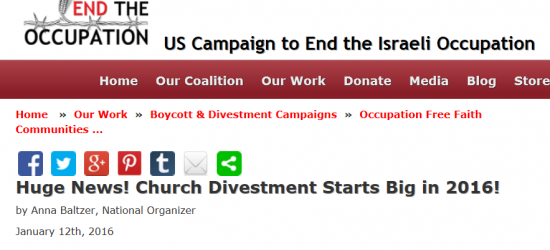
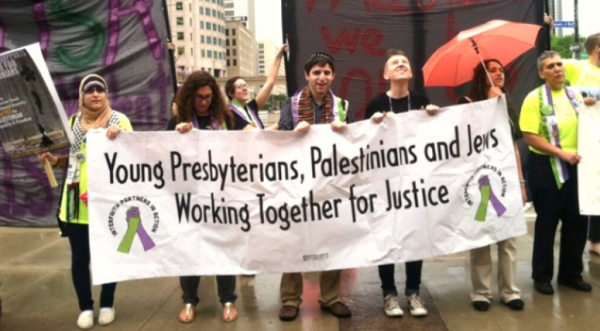

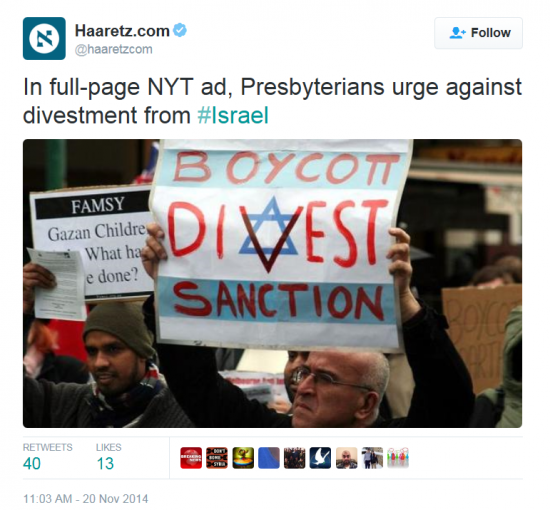
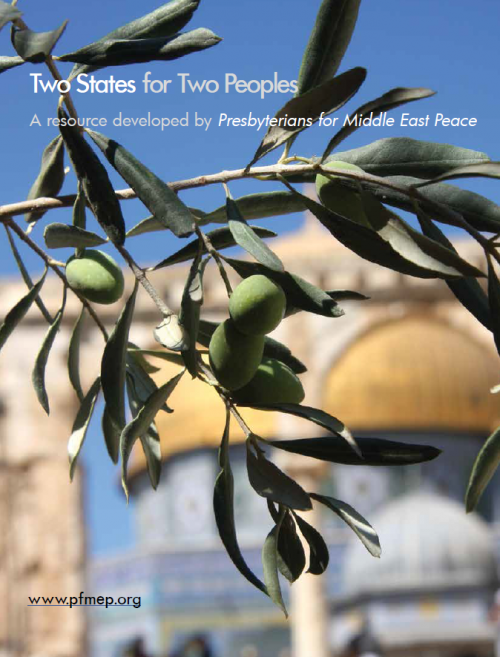
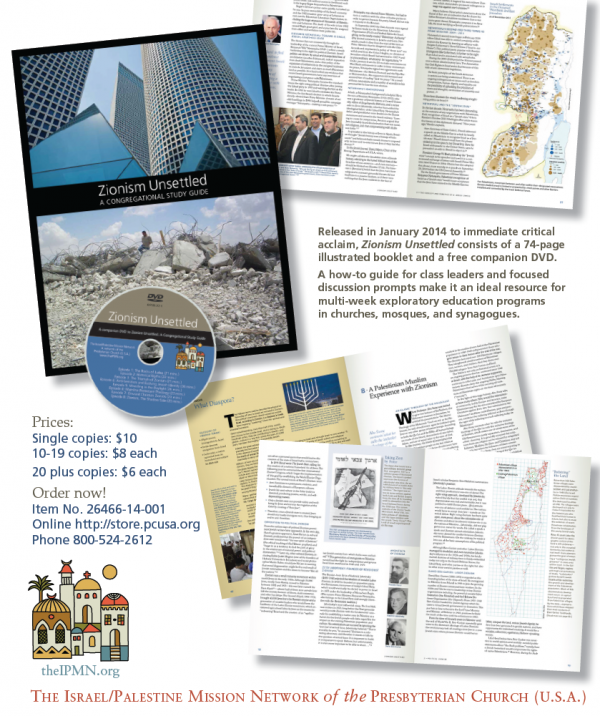
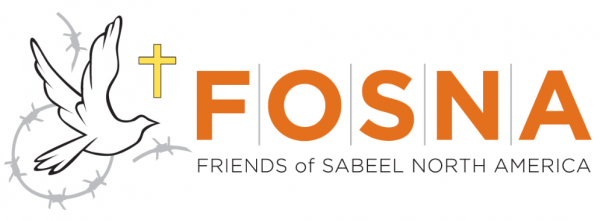
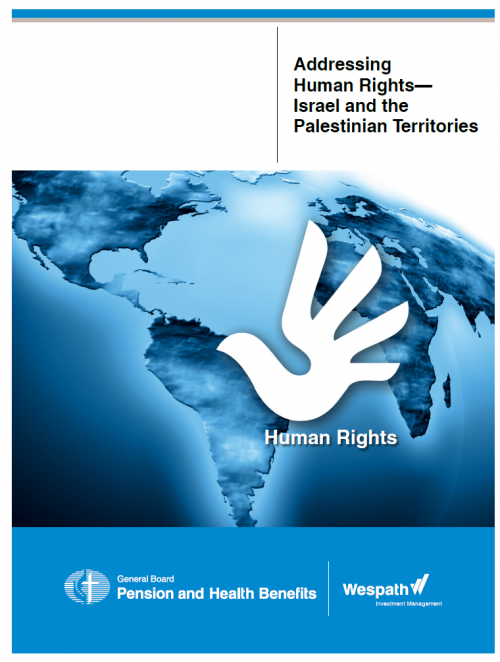


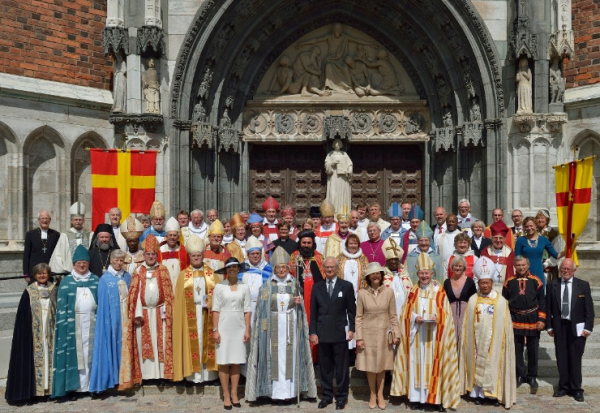



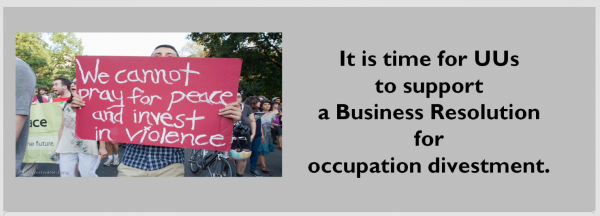
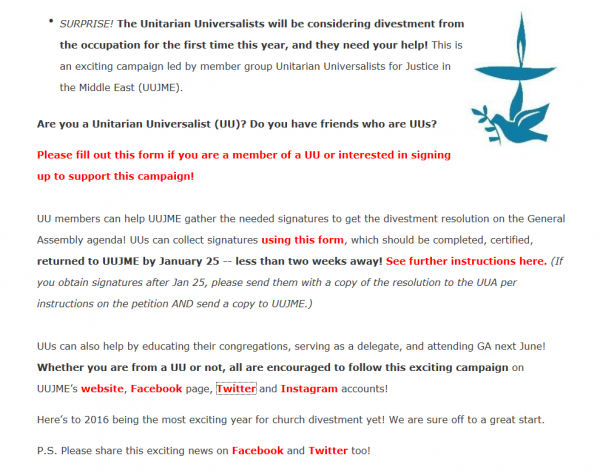
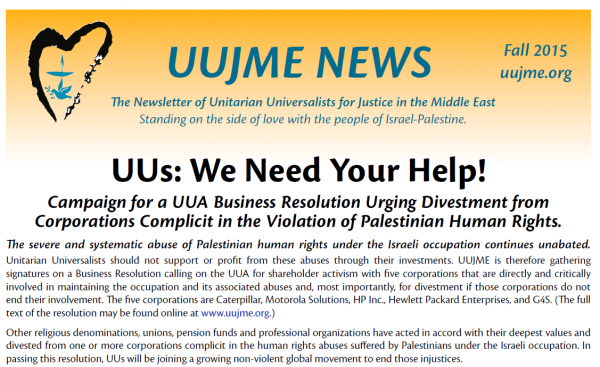
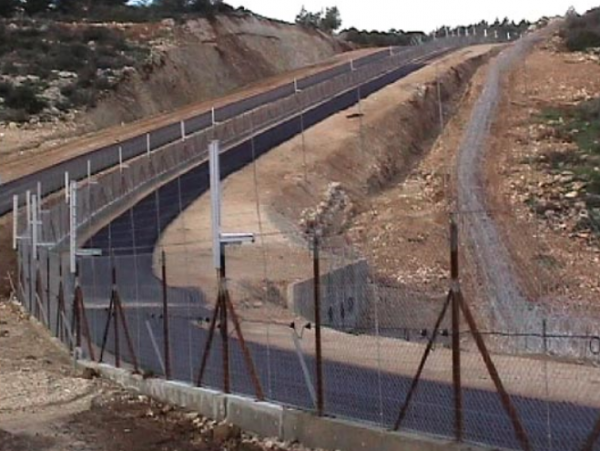

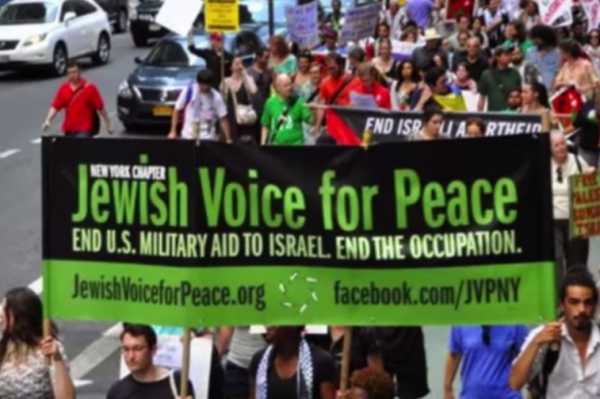
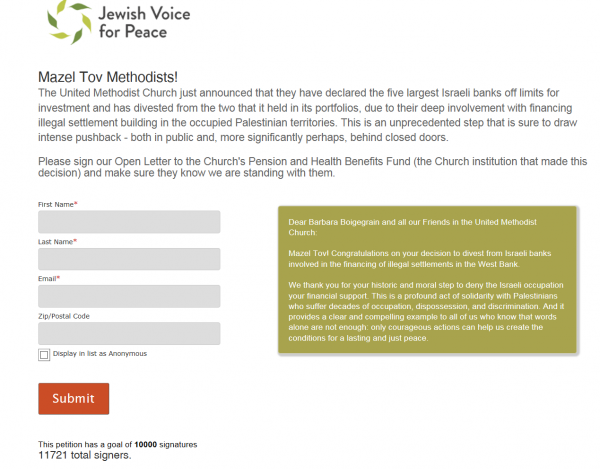
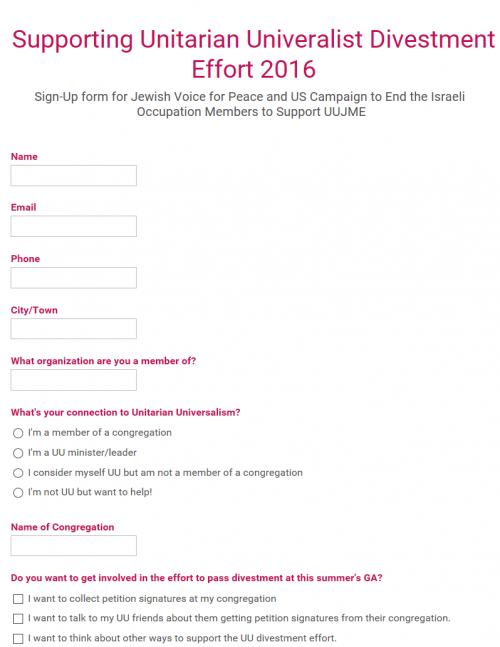
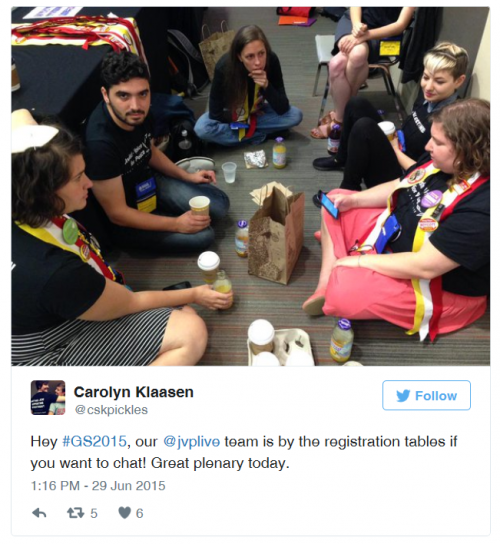
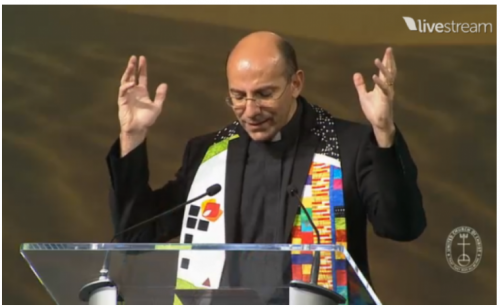
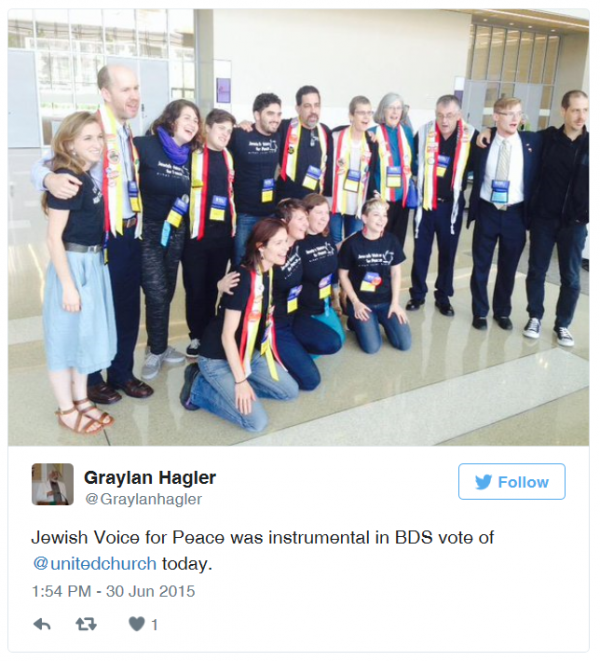
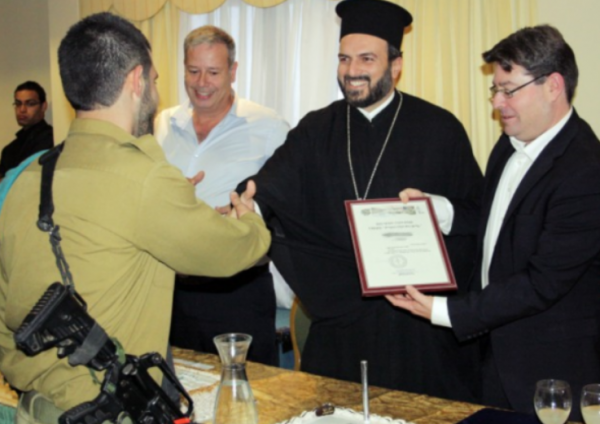
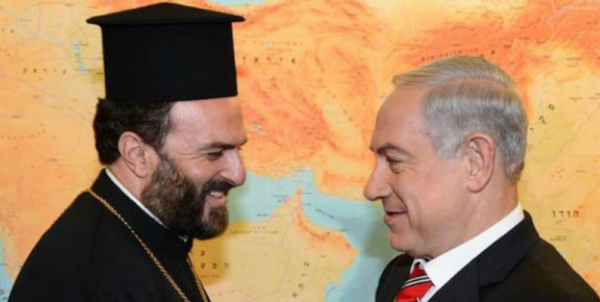
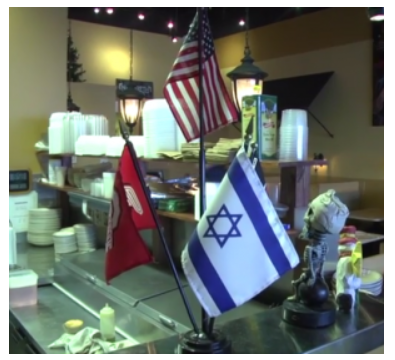
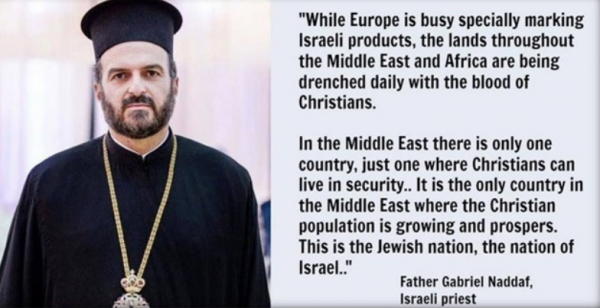
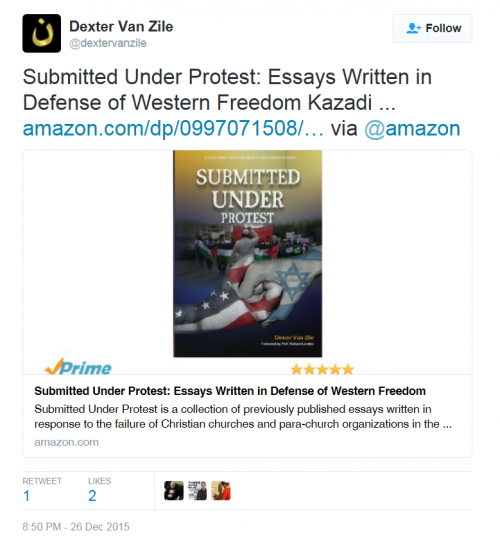







Comments
Donald Trump says he is “a Presbyterian.” But, which denomination?
That’s a good question.
I must say, the (BDS) movement was not hard to see coming. In my opinion, it is getting it’s legs in Europe and Britain. I can only attribute that to the increased Muslem population explosion in these areas. Europe and Britain losing their Christian Faith over the last 100 years, has left them open vessels, just waiting to be filled with who knows what. It could be some new age garbage, Hinduism or maybe Drewidism. But Most likely they have or will convert to Islam. So that’s why I’m not too surprised to see such a misguided, misinformed, group of protesters I’ve seen in years.
Now I read some of the USA Protestant churches are joining in on this racist, antisemllitism, fear mongering garbage. How soon we forget A? The ovens have only been cold for 70 years and some how, every ill in the Palestinian community is the Jew’s fault. For those who have forgotten, and those who never knew, the good ol UN set up the Palistinian mess in 1948-49 and as far as I know, the Palistinian settlements are the “temporary” locations for the Palestinians, still waiting on the UN to secure them a permenant homeland. So before you go blaming Israel for the Palestinian problems, remember who set it up and who’s suposed to be settling the issues, the UN.
As for those of you supporting “BDS” and call your selves Christians, have you forgotten that
your savior is a Jew, a Rabi for that matter. If you know your bible at all, you will remember Jesus’ teaching about Him being the vine and us being the branches, if you are a Christian, then you are “grafted into” Gods chosen people, the Jews. So before you go divesting Israel, the only friend the USA has in all the Middle East, read your bible and pray God would straighten your mind out and help you to understand it’s not Israel holding back the Palestinians, it’s their own leaders and the UN. Israel has done more good in their area of influence in spite of the Palestinians.
I appreciate the commentary on the United Methodist Church, but it is wrong to describe it as simply a ” liberal” denomination. For example, the Presbyterian Church USA and the UCC, for instance, both currently ordain gays and perform gay marriages. According to the UMC Book of Discipline, practicing gays cannot be ordained or get married in the church although some individual church look away if pastors perform gay marriages. The only body which can change the rules is General Conference which meets every four years and is meeting this year-as noted. UMC churches on the East and West Coast tend to be more liberal, but even within churches on the East and West Coast some the larger churches (particularly ethnic churches such as Korean-American UM ones) are quite conservative. Gihghamsburg would be one of the more conservative ones. This relates to divestment because the more conservative churches will not support it and since the UMC is a worldwide denomination divestment is likely not to pass nor will gay marriage this year. If the UMC were to split into an American Methodist Church and follow the terrible trajectory of the Episcopal Church gay marriage and divestment would pass. It behooves every United Methodist clergyperson or layperson who attends their Annual Conference to vote against divestment in any resolutions that are sent to General Conference. and for people who are not attending their Annual Conference to urge their lay or clergy delegate to not support divestment.
I expect that Donald Trump who’s not sure if he ever asked God for forgiveness and refers to Holy Communion as going to church to “drink his wine and have his little cracker” is not particularly religious, although he self identifies as a Christian. He seems to have liked the writings of Norman Vincent Peale who was a pastor in the Reformed Church in America at Marble Collegiate Church in NYC , which as far as a I know,is a very liberal church. My guess is if he’s officially a Presbyterian, it’s PCUSA-the liberal contingent.
Sorry; Ginghamsburg Church is not conservative if they are sponsoring such a Conference; That’s terrible. My mistake.
I have just terminated my membership in the UMC. I would call this “the straw that broke the camels back” but it is more like a brick.
“Antisemitic incidents continue to decline in U.S,” reports pcusa.org April 11, 2014.
Apparently the church is just doing the hard work to help bring those numbers up again.
I expect this crap from the Unitarian Universalist hippies but from Presbyterians and Methodists?
My family left the PCUSA years ago as we saw the trajectory it was taking. One would be amazed at the leftist hype on its national/international websites. The UMC is close behind.
I urge you to go to these websites. Astounding. They are wading deep into political agendas. While I doubt most of the congregants are unaware of what’s happening at the top, they need to take a look. A portion of their tithe will be going to those agendas.
http://www.pcusa.org
http://www.umc.org
This spring three U.S. mainline churches, the Presbyterian Church (PCUSA), the United Methodist Church (UMC), and the Unitarian Universalist Church (UU), will vote on whether to embrace Nazism. They can’t pretend to be Christian if they do.
Genesis 12:1-3 (New International Version)
The Lord had said to Abram, “Go from your country, your people and your father’s household to the land I will show you. I will make you into a great nation, and I will bless you; I will make your name great, and you will be a blessing. I will bless those who bless you, and whoever curses you I will curse; and all peoples on earth will be blessed through you.”
All peoples on earth being blessed through Israel seems to be an accurate description of current reality — look at the way Israeli hydroponics and desalination has been shared. I think the bit about blessings and curses is active too….
Ye olde replacement / supersessionist /God 2.0, theology: God doesn’t love the Jews anymore, he tore up his covenant with them, and now he loves us better. Let’s throw the Jews down the well! Shove ’em in the oven!
There’s another popular religion who believes they’re God 3.0. What fun.